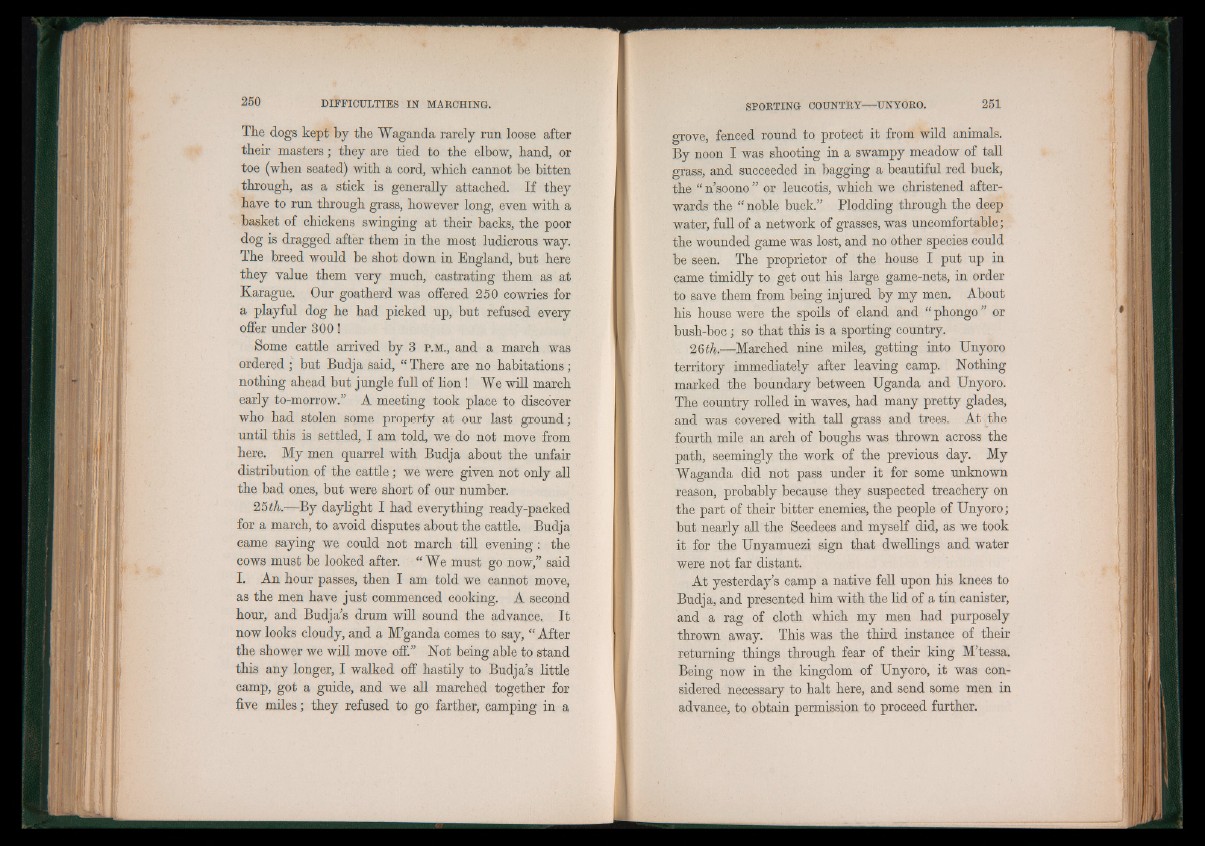
The dogs kept by the Waganda rarely run loose after
their masters; they are tied to the elbow, hand, or
toe (when seated) with a cord, which cannot be bitten
through, as a stick is generally attached. If they
have to run through grass, however long, even with a
basket of chickens swinging at their backs, the poor
dog is dragged after them in the most ludicrous way.
The breed would be shot down in England, but here
they value them very much, castrating them as at
Karague. Our goatherd was offered 250 cowries for
a playful dog he had picked up, but refused every
offer under 300!
Some cattle arrived by 3 p .m ., and a march was
ordered; but Budja said, “ There are no habitations;
nothing ahead but jungle full of b o n ! We will march
early to-morrow.” A meeting took place to discover
who had stolen some property at our last ground;
until this is settled, I am told, we do not move from
here. My men quarrel with Budja about the unfair
distribution of the cattle; we were given not only all
the bad ones, but were short of our number.
2,5 th.—By daylight I had everything ready-packed
for a march, to avoid disputes about the cattle. Budja
came saying we could not march till evening: the
cows must be looked after. “ We must go now,” said
I. An hour passes, then I am told we cannot move,
as the men have just commenced cooking. A second
hour, and Budja’s drum will sound the advance. It
now looks cloudy, and a M’ganda comes to say, “ After
the shower we will move off.” Not being able to stand
this any longer, I walked off hastily to Budja’s little
camp, got a guide, and we all marched together for
five miles; they refused to go farther, camping in a
grove, fenced round to protect it from wild animals.
By noon I was shooting in a swampy meadow of tab
grass, and succeeded in bagging a beautiful red buck,
the “ n’soono ” or leucotis, which we christened afterwards
the “ noble buck.” Plodding through the deep
water, full of a network of grasses, was uncomfortable;
the wounded game was lost, and no other species could
be seen. The proprietor of the house I put up in
came timidly to get out his large game-nets, in order
to save them from being injured by my men. About
his house were the spoils of eland and “ phongo ” or
bush-boc ; so that this is a sporting country.
2 6 th.—Marched nine miles, getting into Unyoro
territory immediately after leaving camp. Nothing
ma.T-kp.rl the boundary between Uganda and Unyoro.
The country rolled in waves, had many pretty glades,
and was covered with tall grass and trees. At the
fourth mile an arch of boughs was thrown across the
path, seemingly the work of the previous day. My
Waganda did not pass under it for some unknown
reason, probably because they suspected treachery on
the part of their bitter enemies, the people of Unyoro;
but nearly all the Seedees and myself did, as we took
it for the Unyamuezi sign that dwellings and water
were not far distant.
At yesterday’s camp a native fell upon his knees to
Budja, and presented him with the lid of a tin canister,
and a rag of cloth which my men had purposely
thrown away. This was the third instance of their
returning things through fear of their king M’tessa.
Being now in the kingdom of Unyoro, it was considered
necessary to halt here, and send some men in
advance, to obtain permission to proceed further.